From School Bench to Gamedev - Rage Quit Games is Conquering the Mobile Games Market
„The worst thing you can do is making a f2p game that can be beaten” - our interview with Rage Quit Games studio, people behind smash hits that aren't popular in their own country.
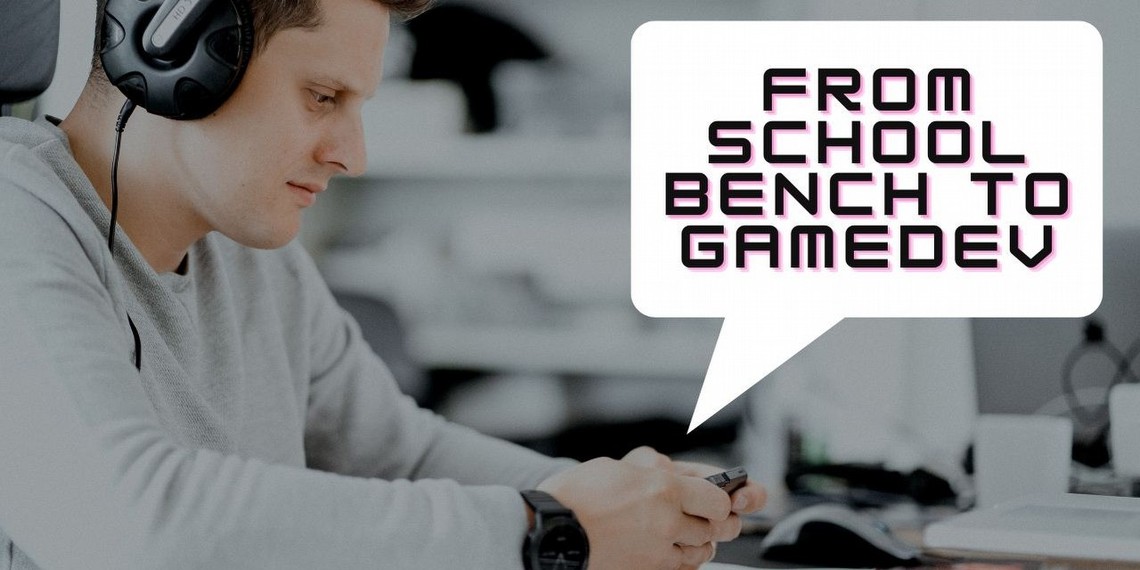
Entering the Rage Quit Games headquarters, I expected a small room, a cubby-hole cluttered with gear, and a few people focused on their screens. Admittedly, I wasn't expecting much from a Polish studio that develops mobile games – and how big a team do you need to create a mobile game? Well, when I entered the office building and saw two large modern floors for 150 people, I found that my old ideas about this market should be strongly updated.
Rage Quit Games is a Krakow-based company that has focused on the mobile games market since its establishment. You may not know them, but as I found out first-hand, you definitely should. Google Play and Apple Store only offer two of their games – The Wolf: Online RPG Simulator and Evil Lands – and the number of downloads of these games is already 170 million... Yes, when we think about Polish gamedev, we immediately think about CD Project, Techland, 11 bit studios, People Can Fly, Bloober Team or Flying Wild Hog. Meanwhile, this is just the tip of the iceberg, because companies such as Ten Square Games or Rage Quit Games have been strong players in their domains. Their games have been tried by millions of players around the world, which of course translates into appropriate profits.
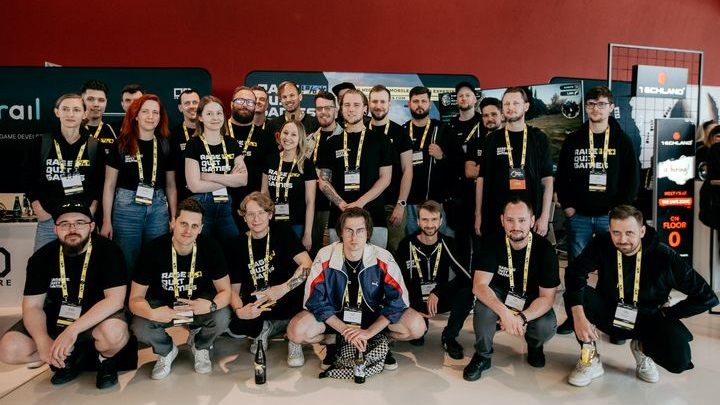
A visit to the studio turned into a nice and honest conversation about their history, the reality of gamedev, and, inadvertently, the war in Ukraine. Listening to them, I was amazed by how young, once inexperienced people turned into a team that now establishes a branch in Kiev. So we will introduce you to the people who create world-class 3D mobile games, using really good graphics and animation. Plus, it's a story of staying modest – it doesn't end with buying a Merc and a house on tropical islands. Rage Quit Games – although big – remain independent. It's cozy, made in Poland, it's outside the stock exchange. Just as independent as they were at the very beginning.
In the studio, I met and talked to Pawel Guminski (Co-founder), Adam Marszalek (Lead Developer), Kamil Preciuk (another Lead Developer), Grzegorz Gorecki (Senior Game Designer) and Maciej Sliwinski (PR & Brand Specialist).

Three mates from school
This still causes surprise. The mobile gaming market is much larger than the PC market. We used to believe that large and technically advanced games appear on PC and consoles, while mobile phones get smaller games that are less engaging, perhaps even less polished. Meanwhile, this hasn't been true for a long time. The mobile gaming market is already so cavernous, diverse and rich that it's difficult not to take it very seriously.
We like to forget about it because we associate this market with bad graphics and bland games for killing time during a commute, and nothing else. Today it's the largest market, albeit a new one, as it has really exploded in the last 10 years.
But Rage Quit Games have come a long way. Before entering the studio, I was aware that its founding story was supposed to go along the lines of "Three mates from school thought they would make games." I asked about it.
Yes it's true. We know each other since primary school, and then we all studied technical faculties and kept in touch.
Pawel Guminski, co-founder of the studio
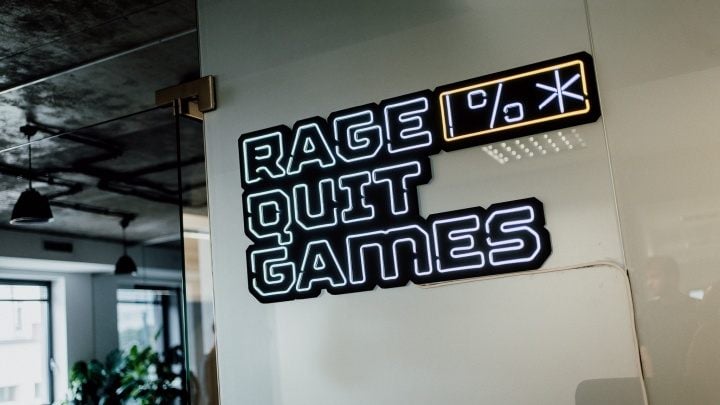
Of course, the road they've come from day-dreaming about game dev during history classes to establishing a 150-person studio was a long and bumpy one.
I have to admit it: we were a bit lucky. We started early when the mobile gaming market was new and there were far fewer games in it. Today the competition is huge, so it's really hard to break through for new teams. Back then, there were almost no 3D mobile games; most were 2D, match-3 games, social-casino, and casual platform titles. But just as we started, our smartphones slowly became more powerful. We have noticed a niche that has not yet been taken seriously by anyone. Back then, there was no PUBG, Garen Free Fire, Fortnite, Star Wars, nor Marvel… So when we started making 3D games, they just stood out among all those 2D ones.
Of course, developing 3D games in a team of three people wasn't easy – Pawel admits that they lacked the processing power to be able to produce a really nice, finished project. Although in some respects, it was easier – they were young and didn't have children, so they could devote their free time to developing games: “We could work 16 hours a day, weekends too. So this "luck" coupled with some really hard work that paid off."

It was then that they made their first game, which is no longer available today – Cat Simulator, which in some respects paved the way for the studio in later years. It was a 3D f2p game that made so much money that the three buddies could hire a team of 10. They rented their first office in the same building in Krakow they're still based in today – this gave them enough space to accommodate the people, equipment as well as their long-term goals and dreams.
I am writing about all of this because I am fascinated by the development process – in case of games, it's usually a process involving multiple people, and full of problems to overcome. Sky is said to be the limit, but then the sky hangs quite high above the young adept of game dev – unattainable, intimidating, unconquerable. Rage Quit Games began in this way – their friendship from school turned into something very powerful, and quite profitable. And all this happened in a country where some mobile gaming was associated mostly with games for Nokia 3310.

Meanwhile, Rage Quit Games has achieved all of this independently – with no external input, no publisher, no large publisher. The modest success of "Cat Simulator" allowed them to reinvest funds to create The Wolf, a game they are developing to this day.
This is our story: good timing, a lot of work and a lot of commitment, and then very quickly reinvesting the money we have earned. Basically, everything we earned was invested back into the company's development, hiring new people, and so we could do without an investor. We're a bootstrap company, i.e. we don't have investors, we are not listed, we do not have a publisher, we did everything ourselves, from scratch, starting as three buddies, and then employing people and hiring teams for the last 9 years.
Well, own capital, successes and possible failures. The ability to completely drop a large publisher is a feature that distinguishes this market from the PC and consoles. The publisher – especially in the f2p model – is basically redundant. Mobile games go straight to Google Play, Apple Store and any other mobile stores, and the role of the developer is to deliver the product, develop it systematically and ensure proper positioning. There is no place for grand marketing or events here. The product goes directly to the user, who rates and evaluates it, thus influencing its future fate. But the most important point here is the quality of the product, not the marketing plan and PR.
The business idea
Interestingly, despite their young age and little experience, fresh graduates made a very mature business decision. They knew they couldn't compete with the biggest studios in these markets and platforms.
When you're making a PC game, you have to realize that, if you're making a shooter game, for example, you're competing with the likes of Call of Duty and CS. The player who sits down at the computer will have to choose between your game and Counter-Strike. Now, try to make a better shooter than Counter-Strike. Or an RPG better than World of Warcraft. It was a simple calculation – but when we grabbed the phone, there was nothing there yet.
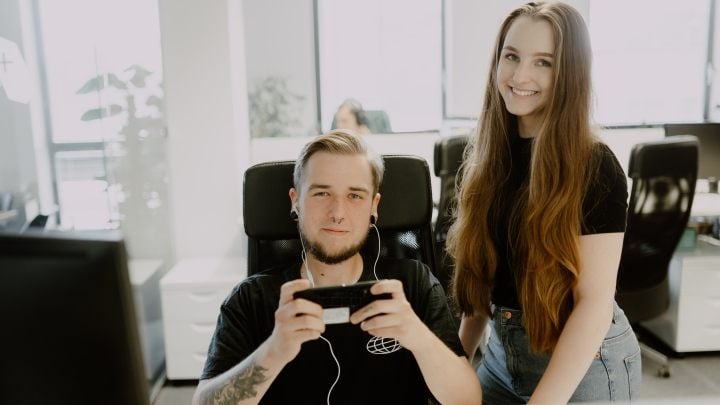
I imagine what the beginnings could have looked like in the case of Rage Quit Games. Good decisions, some luck and skills are one thing, but they were also navigating completely unknown waters at the time. I figured stress levels must have been running high at times. I asked how much stress the developers had to endure at the beginning of this journey, and Pawel admitted that it was a lot, though there were also better moments.
At the beginning, we had the comfort the fact that we were fresh out of college, and the cost of our life was virtually none. So, we could afford a lot of freestyle – we had no one to provide for, we could live in a rented student room and eat cheese from Biedronka (a discount supermarket). The stakes weren't that high then. Then, the stress began to increase. The larger the company, the greater the liabilities and costs, the greater the stress. I would say that the stress is high in the beginning and then it only increases (laughs).
In addition to the Cat Simulator, the first big project and at the same time a milestone in the history of Rage Quit Games was the release of Wolf: Online RPG Simulator. I asked if they remembered the release of this game: "Of course, every second, I remember what the weather was, what I ate, what I drank, where we sat." Although, as Pawel claims, the worst moments are right before the game is released. The worst moments are before the release of the game. Things have to be tweaked in time for the release, everyone is already exhausted and no one is really passionate about their creation anymore. “I would say that once a game is released, the stress is gone. A bit like with final exams: once you've already written them and are waiting for the results, you do not stress out as much as the moment before entering the room. You just don't have any influence anymore. It's similar with games,” Pawel told me.
Of course, the stress inevitably comes back – what will the financial results look like? What bugs will appear? Why are things not working? Waiting for the first comments on the Internet is an integral part of developers' work.
Neverending story
Mobile gamedev, although theoretically it deals with the same thing as PC gamedev, is quite different. The very approach to players on the mobile market is different – go to the Google store and visit any product there; you will see users' comments. These comments are pretty exposed – they are immediately viewable. This is a big difference between the PC and console markets, where, of course, we can rate the game on a given platform, write a comment or review it, but these opinions are much more obscure than in the case of the mobile games. Therefore, the player is someone to be reckoned with – players vote with their wallets, true, but will not vote for a game that seems dead.
Man realizes that developing games basically has no end. It's a single organism – we listen to players, we have our channels, our Discord, we can read the comments, we have dedicated support and social media. We do polls and ask if players like particular features. We don't really compete with other mobile games – we compete with activities usually performed on smartphones. With Facebook, Instagram, news feeds etc. If someone spends an hour on Instagram a day, we want to convince them to play a game instead.
Grzegorz Gorecki, Senior Game Developer

In order to do this, the game needs to be expanded – that's why the development process never ends in the f2p market. Mobile developers have been making games for years. The release is just one of key moments – important, sure – but it's just part of the entire process.
There have been situations when we would update a game, and two weeks later, people would ask "why is the game dead, where are the updates?!" So, when you enter the f2p segment, you have to reckon with the fact that you will not only be making updates, but also make them regularly, in order to give players the feeling that the game is alive, constantly evolving; to make them feel taken care of.
Adam Marszalek, Lead developer
And now we come back to the information from the beginning – what does Rage Quit Games need two floors and 150 employees for? This is one of the reasons for this – the release of the game is just the beginning, it also has to be developed and supported. It's impossible to focus on a new project, because it will take place at the expense of the old one, which already is generating income. That is why mobile studios – contrary to the illusory first impression – are often large. They need enough humanpower to manage prolonged development of the game already released, and then some to work on something new.
The Wolf: Online Simulator RPG
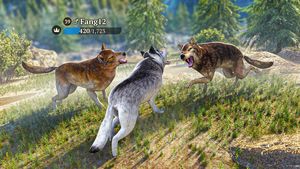
The Wolf: Online RPG Simulator is an MMO game in which we play as a wolf and run around the map with other wolves. We develop our pet, fight other players and take part in various activities. By the way, I asked why they chose a wolf: “We wanted combat in this game, so the wolf suited us best. The giraffe would be a bit off… (laughs)."
Why can't I remember who developed my favorite mobile game?
The gamers' approach to mobile games is different from what we are used to on PC. We all know who made Diablo, Red Dead Redemption or The Witcher – but we don't remember for hell who made Candy Crush Saga. This is another feature that distinguishes mobile gaming from the so-called mainstream.
It looks a bit different today, because the market has changed, but it used to be that when you bought a game, you saw a beautiful cover, and the dev's logo was the first thing that displayed when you started the game. It's different in mobile games – the point is to launch the game as quickly as possible, so often there's no logo at the beginning. The icon is often the only distinguishing element for you.
Kamil Preciuk, Lead developer
Evil Lands

This is the second big MMO from Rage Quit Games. This time, the action was set in a fantasy world – we create our character, choose a class and go to a world full of quests to do and mobs to kill. The production has nice graphics and animations. The production is constantly being developed and can boast a growing number of players.
Indeed, mobile games are supposed to be, well, mobile. Quick, instantly launching and shutting down just as smoothly. It's about providing instant entertainment, because when we start a game on a mobile, we often do it on the go. "The game cannot launch for 4 minutes, because if you have 10 minutes for playing, you lose almost half of that time," Adam Marszalek added. Just as important are push notifications and other mechanics that encourage returning to the game. This is important, because we have to remember that mobile games share the phone's RAM with many other applications that strive for our attention. Equally important is the progression system, which encourages levelling up (and returning, as well as, let's face it, spending money), or the social mechanics (eg. notification that our friends are playing the same game).
The differences between developing mobile games and PC or consoles ones are well illustrated by the history of the creation of Cat Simulator and The Wolf. When they were working on the cat simulator in 2014, various animal simulators were increasingly popular on the PC. There weren't many such games on the mobile market – hence the idea to create a game about a cat that runs around the apartment and does what cats do – i.e. mischief. We can laugh that Poles made their own Stray long before it became trendy. Cat Simulator was a single-player game. Rage Quit Games said that the experience gained during the production of this game will be used in the next project – a multiplayer game this time. They knew that the cat game didn't earn as much as they had hoped because it lacked a progression system – basically a mandatory element of f2p games, which can generate a large income. “The cat game could be completed. This is the worst thing. F2p games cannot be completable. An f2p game must be endless. And the cat game wasn't. In addition, there was no progression system, no experience, you couldn't level up in it,”said Pawel Guminski. If from the perspective of a PC or console player, this kind of staement may seem a downright sin, think about what you like about mobile games? Hardly any plays Fortnite with completionist approach. Having built my anthill for a year and taking care of the ants in one of the mobile games, did I do it to see the end credits? On the contrary – it was for the feeling of progress – and, of course, having fun in casual, relaxing entertainment.
The success of The Wolf, the release of Evil Lands, and the development of the next game, Tomorrow, are all a testament to the studio's rapid expansion. Rage Quit Games seems down-to-earth, and the decisions they make are based on surveys and market research. So, it was only logical that they would soon start thinking about expanding their studio. And their plans didn't only concern the domestic market. They were also looking towards our eastern neighbors.
Polish-Ukrainian Cat Simulator 2
You may not be aware of it, but before the Russian invasion, Ukraine was a big tech outsourcing destination. There were – and still are, despite everything that happened since February 2022 – tons of skilled programmers, designers, and talent of all kinds there. Of course, the expenses there were much smaller, and the close proximity of the two countries was also significant. Therefore, when Rage Quit Games decided to expand, it chose Ukraine.
Tomorrow
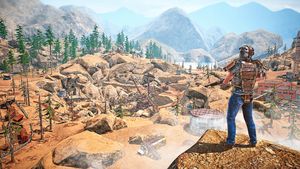
Tomorrow is the newest game from Rage Quit Games. Sticking to the post-apocalypse convention, the MMO shooter focuses on PVE and PVP combat with building bases, collecting resources and hunting animals. The game is currently in the so-called soft-launch, which was released in one of foreign markets, so that it could be improved, expanded and thoroughly tested before the global release. The planned release of Tomorrow is 2023.
Since they had no experience, they wanted to be cautious – the new branch had only 5 people, and they were supposed to focus on creating the sequel to Cat Simulator, as the prototype is already very old and the creators would like to restore it to their portfolio. And then... came February 24, 2022.
Like many Western companies that had offices in Ukraine, Rage Quit Games immediately did what it could to help its employees. And though I have a big imagination, I dare not to imagine what those people must have felt on the morning of February 24, waking up to a completely horrific new reality. It was certainly no longer about the business, money, projects and plans. It was, first and foremost, about the people: colleagues, acquaintances, family and friends.
It's difficult to predict the effects of this war, which is still hot – but we know that in terms of gamedev itself, certain projects have certainly been – and will be – delayed. "You just don't think about developing games at this point," Pawel Guminski told me. The good news is that the employees of Rage Quit Games working in Kiev are okay, and the Ukrainian team – despite the nightmare going on in their country, and perhaps because of it, to some extent – is glad to continue working on Cat Simulator 2. "We're sanguine that the moment will come when we can all get back to doing the things we love," said Pawel.
Indie vibe
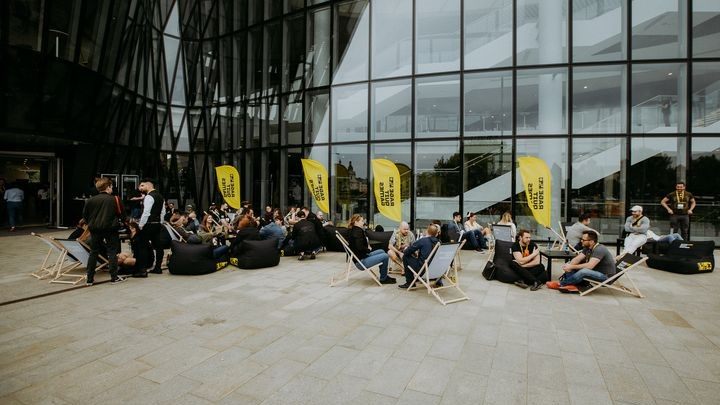
A visit to Rage Quit Games opened my eyes to a market that, although huge, rarely finds room on websites that cover AAA games. Most of all, however, I got to know the history of people who took their dreams from the school benches and realized them in a large studio in Krakow, and then went even further, expanding to a foreign country. And although it's no longer a project of three schoolmates, but rather a company of well over a hundred people, I couldn't shake the feeling that I wasn't talking to people trained by the PR to give sleek and emotionless statements about the "great working environment" and "revolutionary projects that will change the history of games." On the contrary, I constantly felt as if I was talking to people who are still passionate about making games. "The beginnings of this company had a very independent vibe, which we are trying to maintain to this day," said Maciej Sliwinski.
And you can actually feel it. I meet people from Rage Quit Games regularly on the occasion of various gaming events – I always have the impression that instead of selling you a product, they came to spend some nice moments there, have fun, and meet other people. "Size isn't our ambition – the size of the company doesn't matter. The main thing we want is making great games," said Pawel Guminski. And this is an extremely bold statement, which also seems very real.
This article was written in cooperation with Rage Quit Games, who invited us to their offices in Krakow.
- BioWare veteran believes that sometimes it's worth „throwing the thing in reverse and finding another way forward”
- Serena is here. First Descendant Season 2 launches today with 1.2.10 update
- 2025 might just be the best year for Cthulhu and Lovecraft-inspired games, from the horrors of The Sinking City 2 to indie gems like Deck of Haunts
- Xbox's Copilot AI discourages social gaming
- Rainbow Six Siege X release date announced, closed beta active now